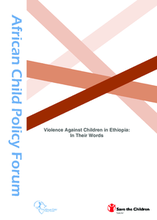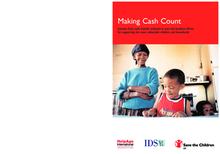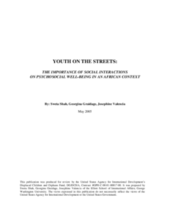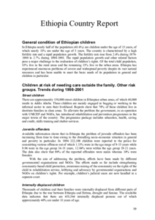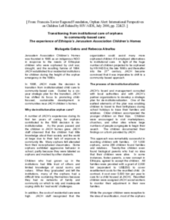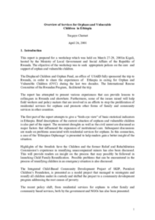childrens_living_arrangement
children_living_without_bio
Displaying 141 - 150 of 155
Analysis of child perceptions and testimonials that comprises the third and final set of results from a major study of violence against children in Ethiopia. Emphasizes child participation for implementation of effective policy.
This paper is a comprehensive examination of cash transfers in Africa and their impact on children. Case studies from Ethiopia, Zambia, Mozambique and Lesotho are discussed.
This paper examines the role, process and impact of cash transfer interventions in Ethiopia using several case studies. Challenges and recommendations for future cash interventions are discussed in-depth.
Research on the psychosocial factors contributing to distress of children living and working on the streets in Ethiopia. Highlights the importance of facilitating social relationships and connectedness. Suggests intervention constructs and measures based on the Psychosocial Child Well-being model.
A description of the programmatic steps taken in establishing a community-based foster home in Ethiopia and an evaluative follow-up on these children ten years later
Discusses the interplay between informal and formal safety net mechanisms in supporting orphans and children made vulnerable by HIV/AIDS. Includes recommendations for strengthening traditional family and community safety nets weakened by the epidemic.
This paper provides a guideline for the implementation of reunification and reintegration programs for agencies providing institutional care for orphans. It outlines the different strategies and activities an organization in Ethiopia used to transition from institutional care to community-based childcare projects.
Country report of Ethiopia on the situation of children in residential care in anticipation of the Second International Conference on Children and Residential Care: New Strategies for a New Millennium, to be held in Stockholm 12 – 15 May 2003.
An account of Jerusalem Association Children’s Homes’ work involving deinstitutionalization of orphaned children in Ethiopia. The report is a summary of the steps taken by this organization to reunify/reintegrate the children into their families and society and some next steps are also mentioned.
A report on a workshop that was presented in Rwanda that sought to share the experiences of of Ethiopia in caring for orphan and vulnerable children. The aim was to provide lessons to colleagues in Rwanda and elsewhere. The report includes statistical data, information on reunification programs, and reviews recent government and NGO policy shifts.

